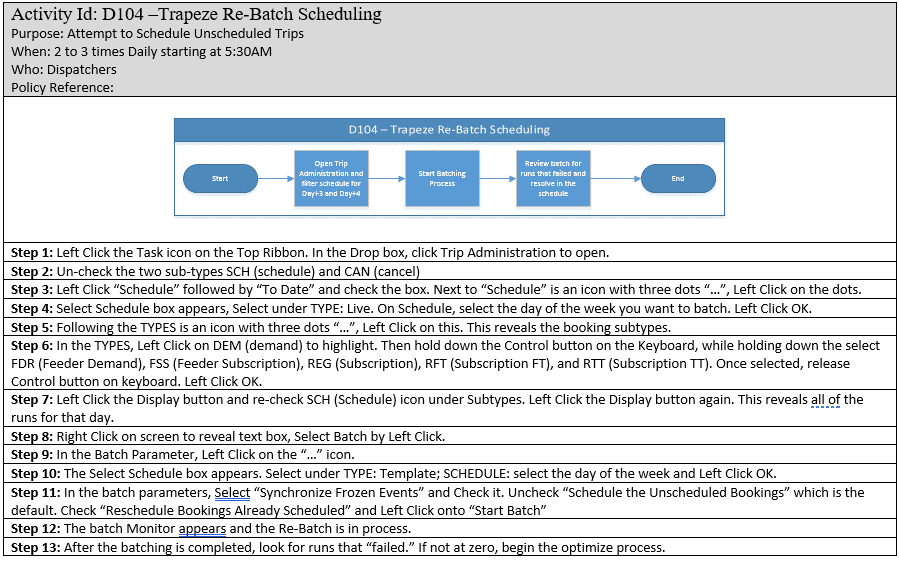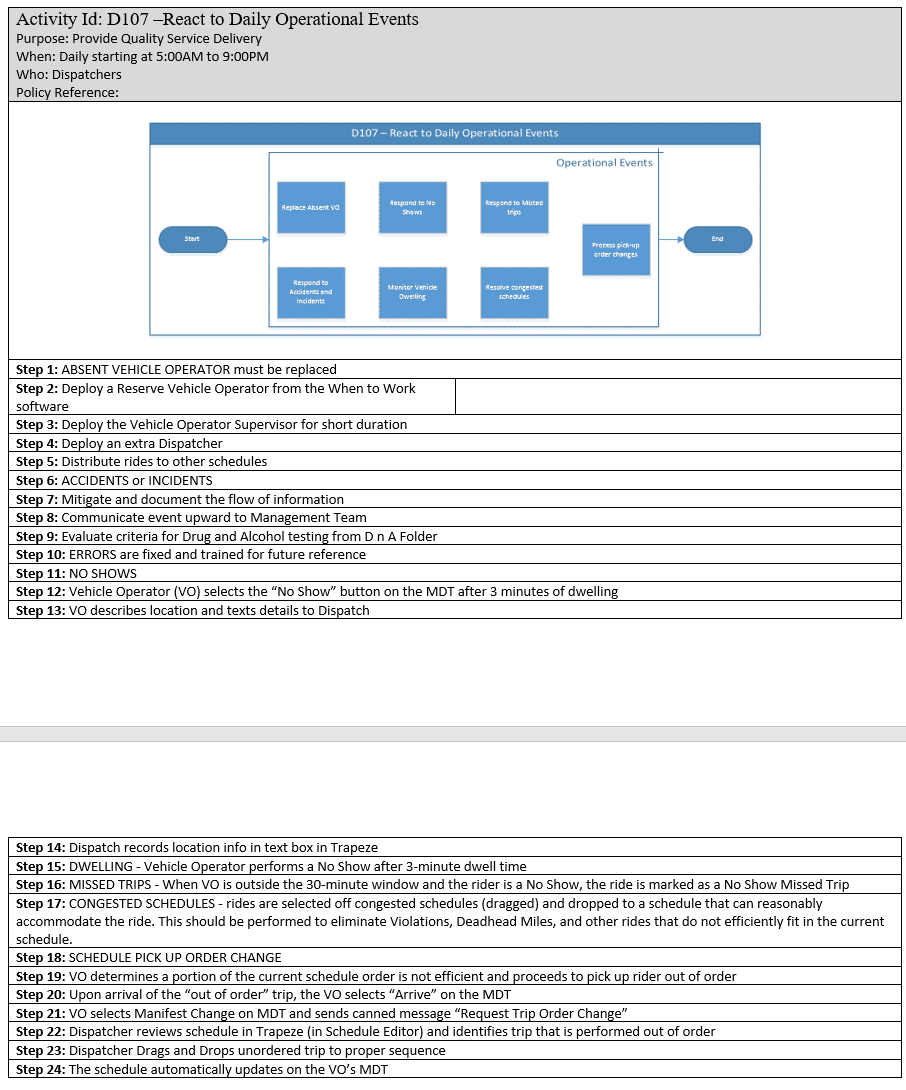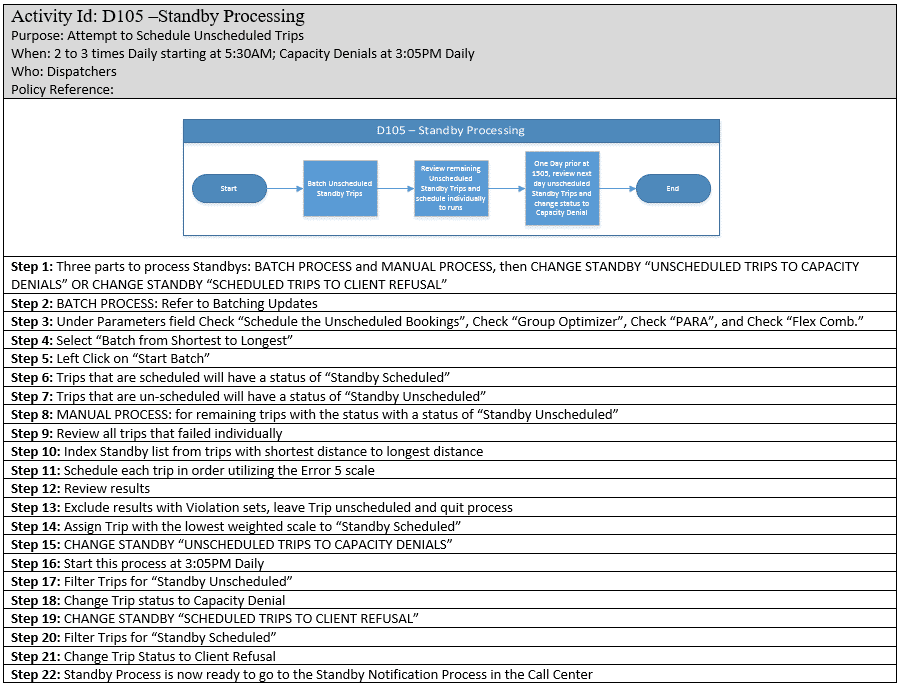Dispatching
Our Dispatchers will oversee all Dispatch operations and coordinate with Call Center Agents, Vehicle Operators, and management to meet the needs of your transit business. The Dispatch Department will open prior to the first vehicle Pull Out of the garage and close when the last vehicle is recovered to the garage. The dispatcher’s main function is to facilitate communication between Vehicle Operators, the Call Center, and Management. Our dispatch department controls all vehicles collectively.

Create, Review, and Manage Runs
Transit Services Group will create runs to deliver the required number of daily revenue hours, maximize the vehicle deployment, and ensure that Vehicle Operators are able to take appropriate breaks. Run Management is critical to ensure that services are delivered appropriately. All non-driver staff will receive any necessary training to ensure they are familiar with Service Guide policies and procedures, the contracted service zone and reservation areas.
Manage and Review Vehicles and Capacities
The dispatcher will update the model and type of vehicle, the garage location, and the seating types and capacities. The vehicle capacities are the most important part of this process, because this determines how many passengers the vehicle can transport in terms of ambulatory, wheelchair users, and creating space for mobility equipment like walkers. The system tracks the number of passengers when processing trips. The system will not allow solutions for vehicles that are over capacity for passengers.
Dispatcher Procedures Overview
Dispatcher Procedures are a collection of events called Activities. All Activities are defined in detail with a step by step procedure. All dispatchers are trained in accordance to the procedures and activities. The procedures and activities listed are defined for the dispatch software that applies to your services. Transit Services Group will update all procedures and activities for the use of the dispatch software.
Dispatch Oversight
The dispatchers will use the dispatch system to monitor scheduling events such as add on trips, cancellations, or other rider requests. The dispatcher also tracks the operational events of Vehicle Operators and updates the system. The dispatcher is to coordinate operational events that affect service delivery and respond to improve the situation. Additionally, it is the dispatcher’s responsibility to identify operational events that require manager interventions or notification. A detailed notification procedure will be submitted to your business management, who will authorize an appropriate response.
Dispatch Procedures Overview

Batching and Optimization
The batching optimization process allows the dispatchers to optimize each day up to four days out to consolidate rides, observe where ridership is centralizing, and create efficiencies in the schedule. It is instrumental in identifying duplicate trips and similar trips with the same location.
Understanding Batching
The scheduling period can allow trip booking 14 days into the future. The dispatching software imports subscription trips into the system on the advent of the 14th day. Many of these trips are usually “fixed” to a run in a set stop order. Some of these trips can be moved in order to make the schedule more efficient. Demand trip requests are scheduled around the subscription trips.
Schedules days that are more than 5 days away from “today” do not benefit much from optimization as the schedules are considered fairly open. Passengers are actively adding, editing, and cancelling trips.
As the scheduled day becomes closer to “today” the schedule gets more and more busy. The impact of trip cancellations and edits make scheduling trips more difficult. Transit Services Group will use the batching process to optimize schedules 3 and 4 days away from “today”. This will improve the efficiencies of the schedules. The batching process has many settings that allow the dispatcher to optimize the schedule without changing the stop order of subscription trips that are set to a stop order.
Re-Batch Scheduling
Purpose
Attempt to schedule trips that are unscheduled.
When
Two to three times daily starting at 5:30 A.M.
Who
Dispatchers

The dispatcher controls the settings for processing the batch procedure. The batch can be limited to only a few trip types or runs. There are some instances where the batch settings are broad when there is an emergency and the system is in a worst case scenario.

Understanding Optimization
Optimization is a manual process conducted by the dispatcher to improve the efficiency of the schedules. The dispatch system has optimizing reports that assist the dispatcher with recognizing duplications, trips that should be grouped together, and other schedule improvements.
The optimizing process is done 1 and 2 days from “today”. At this time the schedule is usually becoming fully booked that there is no benefit to using the system batching does not provide much benefit. A skilled dispatcher can improve the schedule immensely through experience, understanding the abilities of drivers, understanding passenger needs, and by asking/listening to drivers.

Real-Time Dispatching
Dispatchers will use the Novus dispatch system to monitor events such as upcoming late pick-ups, on-time percentage, slack time in current hour and next hour, appointment details (riders with appointment times) for current hour and next hour, and on board violations in current hour and next hour.
Dispatchers are engaged with improving the daily schedules. They will maintain awareness of cancellations and trip changes to move trips in real-time to other Runs. This allows more same-day trips to be scheduled or to shorten a Run Schedule for the day to save expense.

Standbys
Rides that cannot be accommodated through the Novus scheduling system are placed on a Standby status, where there is an attempt to re-book the ride at a later date. After optimization, the dispatchers look for places in the schedule where the Standbys can be placed with minimal or no violations.

